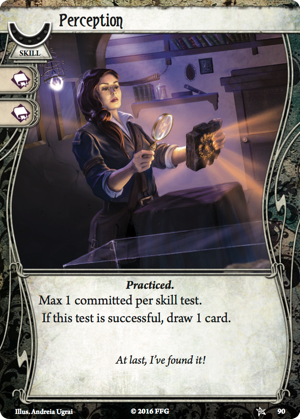-
"Max 1 per skill test" across all players.
- If you commit this card to another player's skill test, and the test is successful, you draw a card (not the other player).
Навичка
Вправність.
Максимум 1 така карта на перевірку.
В разі успішної перевірки візьміть 1 карту.

Related Cards
- Perception (2) (Harvey Walters #28)
- Perception (Revised Core Set #90)
FAQs
(from the official FAQ or responses to the official rules question form)Reviews
If you take a closer look at the popular decks here on Arkhamdb, you may notice that still most of them use a complete set of Guts, Perception, Overpower and Manual Dexterity. I omit Unexpected Courage here, because it functions a bit different.
These cards' popularity is based on their marginal cost and the high versatility they give you. Each of them occupies one deck slot, but there is (on Standard difficulty) a huge chance of drawing another card, so it feels as if they cost nothing. They kind of "replace themselves instantly". Whatever strategy you are running, tests over all four attributes will meet you at every corner (or in every Mythos phase) and you don't have to commit these skills to a particular kind of skill test. The above-mentioned reasons, as a sum, virtually "reduce" your deck size and enable you to draw your key cards much faster. In fact, playing them includes two slight risks:
- The test can fail and the skill does not replace itself.
- The skill succeeeds and the card you draw is your Weakness. Especially, this risk can hurt if you Weakness happens to be Amnesia.
Pros
- +2 on a test for (almost) no tempo hit is really, really good. If taking the test costs you an action, and you're even on the difficulty, then the resulting tempo bump is, on average, worth almost an entire action.
- Can be committed to another player's skill test.
- Zero play cost
- Card text has no trigger restriction (as in Vicious Blow e.g.)
- Combines perfectly with cards that have an additional effect if you overfulfill: List
- "Ashcan" Pete gets more value out of the skill card than the other investigators, since the extra card you draw also works as smelling salts to wake his dog up.
- On High/Expert difficulty you do not want to fail on skill tests, so the +2 bonus alone justifies the inclusion.
Cons
- "Max 1 committed per skill test" across all players.
- The skill succeeeds and the card you draw is a Weakness.
Perception, Guts, Overpower, and Manual Dexterity are by far most cost efficient and overpowered non-asset cards in this game. Usually a good card is something that gives us an equivalent of getting 1.5 actions per 1 action (example: 1 action to draw Emergency Cache, 1 action to play it, and you get equivalent of drawing 3 resources). But Perception only requires to draw as an action, committing is not action, as an example we'll take The Gathering scenario standard difficulty which has 16 chaos tokens:
- If Shroud 4 and Lore 3, we have 2 success tokens, Perception gives us +8 success tokens against 37.5% chance of not replacing Perception card, or 21,3 success tokens per spent card (10.67 per 1 card/action efficiency).
- If Shroud 3 and lore 3, we have 6 success tokens, Perception gives us +7 success tokens against 18.75% chance of not replacing Perception card, or 37.3 success tokens per spent card (6.22 per 1 card/action efficiency).
- If Shroud 2 and lore 3, we have 10 success tokens, Perception gives us +4 success tokens against 12.5% chance of not replacing Perception card, or 32 success tokens per spent card (3.2 per 1 card/action efficiency).
How i calculated numbers above ^, example: assuming no ghouls in your location, taking one plain action to retry Lore 3 against Shroud 2 test without committing resources would give us a chance of drawing 10 success chaos tokens from 16 total tokens, or 62.5% of success, vs. Perception committed it's +4 tokens. How much does committing Perception costs in cards/actions_to_draw_a_card? It's the chance to lose Perception, which is the amount of losing tokens (2) against total tokens (16) = 12.5%. Multiply 12.5% by 8, and you get one action you will spend to draw a card, also multiply 4 tokens by 8, and you get 32 success tokens for one draw card action vs. 10 success tokens of taking another plain research action. 32 vs. 10 = 3.2 as efficient.
And that's not even taking into account its deck thinning ability, 5-8 of these cards will give you the same or better deck thinning than Underworld Support, but 1) without limiting good cards to one copy, and 2) you can commit these to help other players.
The upgraded versions of these cards are not nearly as cost efficient.